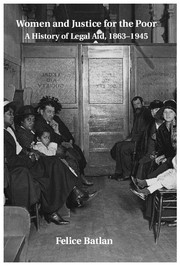Book contents
- Frontmatter
- Contents
- List of Plates
- Acknowledgments
- Abbreviations of Primary Organizations
- Introduction
- PART I A FEMALE DOMINION OF LEGAL AID, 1863–1910
- PART II THE PROFESSIONALIZATION OF LEGAL AID, 1890–1921
- PART III DIALOGUES: LAWYERS AND SOCIAL WORKERS, 1921–1945
- 5 Constellations of Justice
- 6 Compromises
- Conclusion
- Index
- Plate Section
6 - Compromises
from PART III - DIALOGUES: LAWYERS AND SOCIAL WORKERS, 1921–1945
Published online by Cambridge University Press: 05 May 2015
- Frontmatter
- Contents
- List of Plates
- Acknowledgments
- Abbreviations of Primary Organizations
- Introduction
- PART I A FEMALE DOMINION OF LEGAL AID, 1863–1910
- PART II THE PROFESSIONALIZATION OF LEGAL AID, 1890–1921
- PART III DIALOGUES: LAWYERS AND SOCIAL WORKERS, 1921–1945
- 5 Constellations of Justice
- 6 Compromises
- Conclusion
- Index
- Plate Section
Summary
The Depression and federal New Deal programs produced a significant change in how leaders understood, shaped, and categorized legal aid. Legal aid societies that isolated themselves from social service agencies found that they were increasingly out of step with the spirit of the age. New Deal programs and benefits also severed, at least for a time, the links between charity, dependence, and women. Yet some bar associations, increasingly anxious about the ability of their members to earn a living, expressed concern that free legal assistance siphoned off paying clients. To counter this fear, legal aid organizations increasingly identified themselves as social service agencies, a characterization they had long resisted.
During the Depression, the importance of the male breadwinner grew and frequently women were ousted from jobs that could go to men. Yet this did not happen in legal aid organizations, where instead female social workers and lawyers won growing acceptance as legal aid providers. Legal aid organizations also showed a new concern for women as clients, especially manifested in their increasing willingness to accept divorce cases, perhaps because so many men were unable to support their families.
These trends continued during World War II; the onset of the war and the widespread desire to ensure that those in the armed services, as well as their dependents, had access to legal aid brought Americans close to recognizing legal aid as a universal right. Across the country, legal aid organizations suspended or relaxed eligibility requirements. Although it was through servicemen that dependents qualified for legal aid, it was soldiers' wives and mothers who now filled legal aid offices. Like female clients in the past, they sought help with divorces and domestic relations cases. The female legal aid lawyer also received new attention, becoming perhaps the professional equivalent of the iconic Rosie the Riveter.
The hard-fought battles of the 1920s between lawyers and social workers brought social workers new respect from legal aid lawyers. One sign of their acceptance was the appointment of Bruce Cobb as chief attorney of the Legal Aid Society of New York in 1930.
- Type
- Chapter
- Information
- Women and Justice for the PoorA History of Legal Aid, 1863–1945, pp. 185 - 214Publisher: Cambridge University PressPrint publication year: 2015



